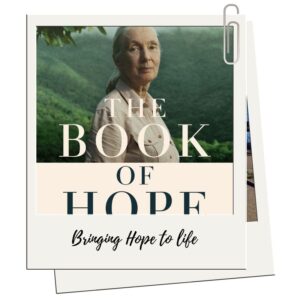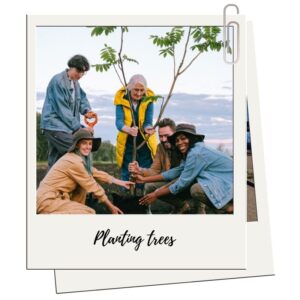 Jane Goodall is a hope merchant. She is nurturing hope in a volatile world and has recently published ‘The book of Hope.’ This was the perfect start to 2022 for me. I’m a big believer in the right book at the right time, for the right person and Jane Goodall’s voice was a beautiful way to begin the new year.
Jane Goodall is a hope merchant. She is nurturing hope in a volatile world and has recently published ‘The book of Hope.’ This was the perfect start to 2022 for me. I’m a big believer in the right book at the right time, for the right person and Jane Goodall’s voice was a beautiful way to begin the new year.
I’ve had the absolute privilege over the last year of time. Time with my family, time to explore our beautiful country and time to learn about the things that interest me. I’ve allowed my curiosity to guide me and found myself learning about our environment and the challenges it faces. After all I’ve learned, I needed to nurture my own hope.
If the name Jane Goodall sounds familiar, that’s because she’s the pioneer in chimpanzee research and changed the way we thought about primates and the capacity for animals to use tools, communicate and feel emotions. Learn more about Jane at https://www.youtube.com/watch?v=rcL4jnGTL1U . She’s a pretty remarkably woman and has written this book to inspire hope in a time when hope is the very thing our world needs most.
What is hope?
Hope is looking forward to something better and believing that it is possible. Snyder’s hope theory is common in positive psychology and Jane refers to it often in her book. Snyder believes hope consists of three elements and Jane has added a fourth.
- A goal – Something meaningful and worthwhile to work towards.
- Pathways – Multiple avenues to reach the goal and achieve the desired outcome.
- Agency – The belief that you have the capacity and capability to achieve it.
- Social support – The connections, resources and assistance of others who care.
Archbishop Desmond Tutu is quoted as saying he was a prisoner of hope. He believed that while optimism can be shattered by negative events, hope is being able to see the light despite the darkness all around. While we in the world of positive psychology know the profound benefits of hope, they are made explicit to the reader citing a meta-analysis of over 100 hope studies. Hopeful people gain a 12% increase in academic performance, 14% increase in workplace outcomes and a similar boost to overall happiness.
The Worlds big challenges
I don’t think anyone with an internet connection could argue that our world is facing trying times. The current pandemic has shone a light, brighter than ever, on the world’s issues. With the pace of change accelerating exponentially, unfortunately our time to act is diminishing.
Jane believes there are four key challenges that we must address in order to nurture hope in our volatile world. The issues are all interconnected, and Jane’s wisdom shines through in how she hopes to improve the environmental situation in a wholistic way. The four challenges are:
- Alleviate poverty – for it’s often those living in poverty that exploit the environment around them and make choices based on the cheapest option for themselves.
- Reduce consumption – we buy way too much stuff, which means it must be sourced, made, and disposed of. We need to understand this cycle and improve it drastically.
- Eliminate corruption – with good governance and honest leadership we can create a more equitable society and elevate the good within communities and organisations.
- Manage population growth – more people mean more food production, which means more forests being cleared for farming and livestock.
While the book goes into our disconnection from nature, personally, I’d place this as another key priority. As long as the general population is content to work, shop, socialise and relax online, our connection to the natural world will continue to diminish. If we don’t spend time relaxing under trees, walking along a river or swimming in the ocean, we fail to notice the significance of nature and could easily miss the precarious state of our planet.
Jane’s four reasons for hope

The ability to simplify things seems to be one of Jane Goodall’s strengths and she believes not only that we have a hopeful future, but that this can become a critical point in history in learning to nurture hope in a volatile world. She aims to bring out our best, collaborate and resolve not only the treat to our environment but many social injustices along the way. Is she optimistic? Absolutely, but here are the reasons for her unwavering hope.
- The amazing human intellect. This is no doubt that humans have evolved into an intellectually superior species. We can put man on the moon, uncover secrets at the centre of earth and create machines to do … almost anything. While we are destroying the planet at an alarming rate, the pace at which we are learning is also accelerating. We have solved countless conundrums before by sharing information, pooling resources and learning to be agile in the face of adversity. Developing a covid vaccine within 12 months is a beautiful example of what we can do when our lives depend on it. We are smart enough to solve this environmental challenge, we simply need to have the head and heart pulling in the same direction.
- The resilience of nature. Jane shares a story of Bamburi Cement Company in Kenya. The owner of the company, Felix Mandl, having seen the environmental damage his company created, tasked a horticulturalist to restore the quarry to it’s former natural state. This was a 500acre stretch along the Kenyan coast where nothing would grow, and the land had become an industrial scar on the earth. After ten years, Felix could see trees that had grown over 30 metres high with a wide variety of native plants established and wild animals like zebras and giraffe’s grazing. Nature can survive and will surely endure.
- The power of young people. Most adults in the western world have been raised in an individualistic, disconnected and abundant society. Weather we resonate with that view or not, it’s not a mindset that equips most adults to solve this environmental crisis. We need fresh eyes, strong arms, passionate hearts and loud voices. We need young people to feel furious and to turn their fury into dedicated and focused action that educates and shows us that we can make a difference.
- The indomitable human spirit. Jane has a favourite quote “The difficult is hard. The impossible, just a little harder.” There are so many examples where humans have overcome adversity and achieved the impossible. She shares the story of Jo-Jo a chimpanzee in Detroit Zoo who was chased into the surrounding moat by three larger chimps. Jo-Jo began to drown, and the running water quickly pulled her under. Rick Swope, a truck driver who was visiting the zoo with his wife and children, jumped into the water, dove under and dragged a lifeless Jo-Jo, back to the bank. Rick didn’t think of his own safety and while Zookeepers looked on, fearful for Rick’s life, and bystanders cheered him on, no one else helped. Rick’s fearless actions saved Jo-Jo’s life and is an example of the indomitable human spirit and all that we are capable of when we nurture hope.
Finding hope around us
In this era with so many burning issues it’s easy to feel overwhelmed, powerless and become hopeless as a result. We live in an age when distraction is at an all-time high, so it’s easier than ever before to numb that frustrated and hopeless feeling with shopping, Netflix or a triple choc cookie. However, there is so much we can do, starting with our own homes and families. It’s time we picked up the torch and begin inspiring others to do the same.
Two men who live in a small village in rural China we’re concerned that local forests and rivers had become polluted and degraded over recent years. Mining had eroded the soil and no trees would grow. The animals were gone and the rivers so polluted the aquatic life was disappearing too. Many villagers has lost hope, but the two friends decided to do something. Jia Haixia was blind in one eye from birth and lost sight in the other more recently in a work accident bringing on severe depression. His best friend lost both arms at the age of three when he touched a downed power line.
WHen Jia Wenqi came up with the idea to plant trees, he had no money and no arms, it seemed an impossible goal. But he believed he could be his friends eyes, while his friend could be his hands. Together they began taking cuttings from established trees and in the first year planted and cared for 800 tiny trees.
Imagine their disappointment when only two cuttings took root and grew.
Rather than give up, they learned. Over the past ten years the two men have planted over ten thousand trees and are quoted as saying “Though we are limited physically, our spirit is limitless. So let the generations after us, and everyone else, see what two handicapped men have accomplished. Even after we’re gone, they will see that a blind man and an armless man have left them a forest.”
While theirs is a wonderful example of bringing hope to life, we might question weather it was their strong bonds of friendship or their environmental quest to improve their village that sparked their motivation. Perhaps both were essential to nurture hope in a volatile world?
Bringing hope to life
There are so many ways that you can nurture hope in a volatile world. Hope for our planet, hope to over come this pandemic, hope to reconnect with wholesome values and most importantly, hope that tomorrow will be better than today. Here are some very simple things you can do to nurture hope for yourself and those you love.
- Spend more time in nature. Get to know your local bush walks, river trails and beaches. It’s incredibly good for your mind, body and soul and will help you notice how precious our natural world is. Without caring for our environment on a very personal level, we can’t hope to create positive change around us.
- Watch David Attenborough’s new documentary “A Life on our Planet.” This is a beautiful tribute to his life and the changes he’s seen over the last 70 years. While it’s a scary reality, he shares so much wisdom and hope for what is possible in years to come.
- Watch the ‘Story of Stuff‘. It’s a favourite clip of mine about where our stuff comes from and where it goes. It’s a little dated now, but the message is simple and packs a punch about consumerism.
- Buy less stuff and educate yourself on what you buy and where it comes from. Gradually find and purchase more environmentally friendly products and find more ethical companies to purchase from. As you make the change inspire friends and family to swap too.
- Focus on the good environmental stories around the world, because there really are some remarkable things happening and challenges already solved. This is a great wrap of the positive environmental stories of 2020.
 My personal hope
My personal hope
While the world is in this volatile, uncertain and complex state, I believe it’s imperative that we nurture hope wherever and whenever we can. I hope that you believe change is possible and more importantly, that you’re committed to taking some small action to make a difference today. Talk about the environment, share stories of success and most importantly nurture hope within yourself.


 My personal hope
My personal hope




